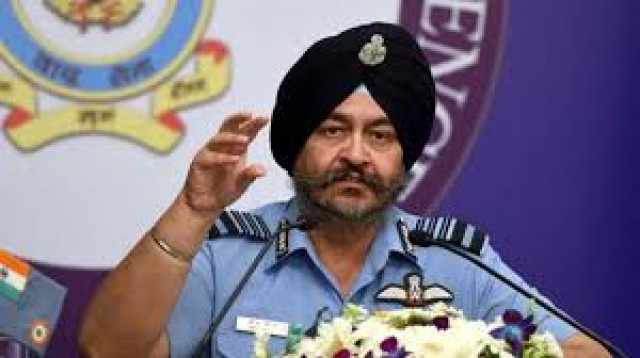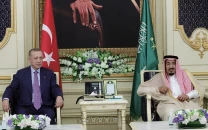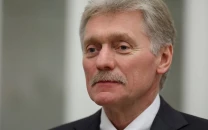IAF chief refuses to give Balakot air strike casualty figure
Says govt should give casualty figures

Air Chief Marshal BS Dhanoa. PHOTO: HINDUSTAN TIMES
"IAF doesn't count the number of dead," he said in a briefing.
He also announced that India will induct Rafale jets to its fleet in September.
India has ordered 36 planes from Dassault Aviation as part of a modernization programme of the air force which is phasing out its Soviet-era planes, Reuters reported.
The statement comes after Indian Premier Narendra Modi indirectly conceded the superiority of Pakistani military in the confrontation between the two countries triggered by the February 14 suicide attack on Indian occupying forces in the Pulwama district of the disputed valley.
“Today, we badly felt the absence of Rafale fighter jets [in our air force fleet]. If we had Rafale, the scenario would have been different,” Modi said while speaking at the India Today Conclave 2019 in New Delhi on Saturday.
Pakistani forces remain on alert despite ‘calm along LoC’
The Modi administration has signed a multibillion-dollar deal with French defence manufacturer Dassault Aviation to acquire 36 Rafale jets in an effort to overhaul the Indian Air Force. The opposition accuses Modi of wrongdoing in the deal.
The Russian-made MiG jets form an important part of the IAF fleet. India started using the MiGs in 1963, but since 1970, 170 pilots and 40 civilians have been killed in accidents involving the aircraft series. Due to the high rate of crashes, MiGs have come to be called ‘flying coffins’.
Modi criticised the opposition for politicising the Rafale deal. “We continue to suffer due to the politicisation of the Rafale deal. The vested interests and politicisation have caused great harm to the nation’s interest,” he said.
Responding to the accusations, Congress spokesperson Manish Tewari said Modi had "himself questioned the air strike. He said had the Rafale jets been there (with the IAF), the results would have been different. What is the meaning of this?"
Modi indirectly admits the superiority of Pakistan’s armed forces
Tensions escalated dramatically between Pakistan and India on February 14 when a young man – a native of Indian occupied Kashmir (IoK) – rammed an explosives-laden car into an Indian military convoy, killing at least 44 soldiers.
India was quick to blame the state of Pakistan for the suicide bombing.PM Imran offered every possible help in the investigation, but India turned down the offer and whipped up war hysteria.
On February 26, the Indian Air Force violated Pakistani airspace. The country’s top civil and military leadership declared the violation of airspace by Indian fighter jets “uncalled for aggression” and decided that the country would respond at a “time and place of its choosing”.
On February 27, Pakistan announced it had shot down two Indian fighter jets that attempted to violate its airspace and captured an Indian pilot. The military’s media wing later released a video of the pilot, who introduced himself as Wing Commander Abhinandan bearing service number 27981.
Director-General Inter-Services Public Relations (ISPR) Major General Asif Ghafoor said in a press conference that the armed forces had responsibly retaliated to Indian incursion by striking a target few miles from an Indian military’s administrative unit to ensure there were no human life or collateral damage.“We decided to not hit a military target or endanger human life. We did not want to retaliate at the cost of regional peace. We do not want escalation,” he told reporters.
India asks Pakistan to ‘do more’
A few hours later, Prime Minister Imran Khan took the nation into confidence over the armed forces’ response. As escalating tensions fuelled concerns of all-out war between nuclear-tipped Pakistan, Imran warned of catastrophic consequences should “better sense” not prevail. The premier ended his speech with another peace talks offer and cooperation in Pulwama attack investigation to India.
On February 28, the Foreign Office said it received a dossier on the Pulwama attack from the Indian government. It added that the government was deliberating whether to treat Abhinandan as a prisoner of war (POW) or apply any international convention.
In the evening, PM Imran addressed a joint session of the parliament and announced that Pakistan would release the captured pilot as a goodwill gesture to de-escalate tensions.
On March 1, Pakistan ‘as a goodwill gesture’ handed over to Indian authorities the captured IAF Wing Commander Abhinandan Varthaman as the nuclear-armed neighbours scaled back a confrontation that has prompted world powers to urge restraint.
It may be mentioned here that the United States, Saudi Arabia, United Arab Emirates (UAE), UK and European Union (EU) were involved in both overt and covert diplomacy to find a way out of the impasse between the two countries.



















COMMENTS
Comments are moderated and generally will be posted if they are on-topic and not abusive.
For more information, please see our Comments FAQ